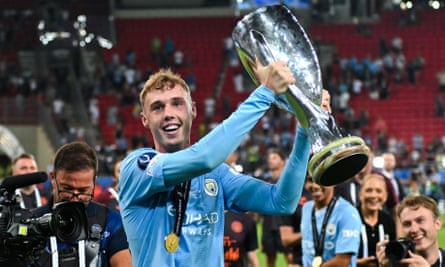How to establish a football dynasty? For decades, the orthodox, long-range formula was to establish excellence within the youth team, recruit complementary talent, and facilitate those with club values within their veins to set standards, to help run the dressing room for a manager.
European football’s greatest teams have almost always laid their foundations on youth systems – Pep Guardiola’s Barcelona, Arrigo Sacchi’s Milan bedrocked by Milanello-hewn defenders, Johan Cruyff and his fellow Ajax graduates, the Bayern Munich team led by Franz Beckenbauer – all followed the template.
Much the same went for English football, with Manchester United’s Busby Babes and Class of 92, and Don Revie’s Leeds; teenagers cleaved together, collective spirit and shared experience forging their growth into winners. Liverpool of the 1970s and 1980s bucked that trend with lower-division talent expertly scouted but they were accompanied by locals such as Tommy Smith, Phil Thompson or Jimmy Case. Brian Clough’s Nottingham Forest’s strength lay in the recruitment skills of Peter Taylor but the key player was John Robertson, signed at 17.
Can this formula still be successful in modern football? Almost certainly not. In today’s globalised industry, all geopolitics and venture capital, the likelihood is a David Beckham, a Peter Lorimer, a Case or a Robertson would have been sold long before they reached their peak. Youth teams are now a revenue stream rather than the fundament, a symptom of the former glory game becoming big business rather than a sporting, community endeavour.
On the Premier League weekend just gone, Cameron Archer scored a lovely, first-time strike for Sheffield United against Everton, Billy Gilmour pulled midfield strings for Brighton while Lewis Hall watched from the Newcastle bench, and Cole Palmer played 38 minutes of Chelsea’s defeat by Nottingham Forest.
It wasn’t meant to be this way. Archer was previously Aston Villa’s jewel of a youth-team striker. Gilmour was groomed to be Chelsea’s answer to Andrés Iniesta. Hall, at Chelsea since he was eight, was last season’s academy player of the year. Wythenshawe’s Palmer, as recently as last month, was Manchester City’s goalscorer in both the Community Shield and European Super Cup.

Money, as ever, is the underpinning reason why football talent increasingly rarely flowers in the garden it was planted in. One of the unexpected, almost certainly unplanned aspects of financial fair play regulations is that academy players whose book value is practically zero – Gilmour cost £500,000 in development fees from Rangers at 16 – register as pure profit when transferred to another club. As FFP regulations retighten after a partial relaxation during Covid times, the temptation to cash out such easy money is proving irresistible.
Clubs have long used their youth setup as profit centres, Manchester United in the 1990s and 2000s sold unwanted talent to clubs down the pecking order with Alex Ferguson’s kite-marked guarantee. Under the latest trend first-team players previously expected to form the backbone of a squad are traded out. Mason Mount in a United shirt will take getting used to, not least because he had seemed likely to be a one-club, John Terry-style Chelsea man. Players like Mount once helped maintain a club’s identity, but at a time of foreign ownership, of resonating with a global audience, who needs a local hero? Perhaps only Arsenal, with Bukayo Saka as a fans’ favourite and Eddie Nketiah trusted by Mikel Arteta to be backup striker, follow anything like the old-style practice of nursing along homebred talent.
Chelsea took an initial £55m for Mount, reinvested in their billion-pound outlay on players on cheaper wages and longer contracts than Mount was prepared to accept. He joined Ruben Loftus-Cheek, Ethan Ampadu and Callum Hudson-Odoi as a youth product sold on, for a collective sum estimated at about £100m. That group, graduates of what was once an all-conquering youth setup – nine-time finalists, seven-time winners of the FA Youth Cup in 11 years – thus provided seed capital for Todd Boehly’s transfer market contortions. The significantly younger Hall, 18, who joined Newcastle on a season-long loan with an obligation to buy for £28m after just 12 Chelsea appearances, added more to Boehly’s pot.
after newsletter promotion
For once, despite their briskness of business, Chelsea were no outlier. Manchester United spent much of their summer window hawking Scott McTominay around for a fee of £40m, not necessarily because Erik ten Hag saw no use for him, having also sold Fred, but instead for the profitable premium he might collect. Archer departed Aston Villa for £18m, joining an exodus of Villa players who lifted the 2021 Youth Cup, including Aaron Ramsey and Carney Chukwuemeka, the latter joining Chelsea last year, to help fund Monchi’s transfer dealings as sporting director for Unai Emery’s team.
Beyond £40m for Palmer, Manchester City have generated significant funds in monetising players with minimal first-team appearances. Last summer, Southampton paid a collective £38.5m for City’s Gavin Bazunu, Juan Larios, Samuel Edozie and Roméo Lavia. The last of these was sold to Chelsea for £58m, 20% going back to City; there is serious money in the horse-trading of unvarnished talent. This summer City collected £19m for James Trafford, a goalkeeper joining Burnley without ever playing for the first team. Meanwhile, after loans for Tommy Doyle and James McAtee, only Rico Lewis now seems likely to emulate Phil Foden in becoming a first-team graduate from a much-admired but also profitable academy.
When everything in football has its price, the time shortens between faces of the future becoming cashable assets. Anyone wanting to build their modern footballing dynasty is just going to have to pay up for other people’s players.

